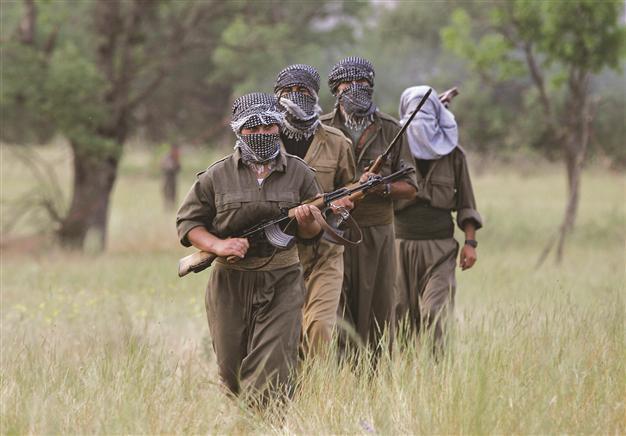Jailed PKK leader Öcalan may have new visitors before elections
ANKARA – Hürriyet Daily News

The government may consider letting journalists to visit Öcalan to revive the stalled peace process. AA Photo
Dominance of the national agenda by items such as the 90th anniversary of the Republic of Turkey, the opening of the Marmaray railway -- connecting both sides of Istanbul from deep under the Bosphorus – on the exact date of this anniversary and finally the attendance of four female lawmakers to a General Assembly Parliament with their headscarves, led the government to take quiet steps to recommence the stalled peace process.
Deputy parliamentary group chairs of the Peace and Democracy Party (BDP), İdris Baluken and Pervin Buldan, travelled to the Kandil Mountains in northern Iraq where the outlawed Kurdistan Workers’ Party (PKK) headquarters is based, following their meeting with imprisoned PKK leader Abdullah Öcalan on Oct. 14.
Upon returning from Kandil, Baluken and Buldan held meetings with governmental officials, including Justice Minister Sadullah Ergin.
Öcalan’s three main demands for being able to convert the ongoing peace process with Ankara from a period based on “dialogue” to one of “negotiations” amid questions surrounding the future of the process are already known by the public: 1. Being able to meet with his lawyers, media and civil society organizations (CSOs) - that’s to say, expanding his contact with the outside world as opposed to being limited to only talk with BDP delegations and his siblings; 2. The easing of conditions for PKK members in mountains, prisons and in Europe through legislative means so that they would be able to join legitimate politics; 3. Establishing a monitoring board.
Since Kurdish politicians are aware of the fact that the government may not be able to take bold steps before the March 2014 local elections, they do not hold high expectations. The government is, meanwhile, planning to take small surprising steps in the near future, so that there would not be a grave regression in the process at least until after local elections.
Accordingly, the government may consider letting journalists and prominent opinion leaders, probably out of members of the Wise Persons Delegation, to visit Öcalan in the coming days. The Delegation was formed with 63 prominent opinion leaders, academics and CSO figures in April as part of the peace process aiming at resolving the century-old Kurdish issue by aiming at putting an end to the three-decade old conflict between Turkish security forces and the PKK.
The newly-found People’s Democratic Party (HDP) may be instrumental in taking such a step. The government is also heeding the call for the formation of a monitoring board.
Fulfilling of other key demands such as meetings between Öcalan and senior leaders of the PKK or the Kurdistan Communities Union (KCK), the urban wing of the PKK and legal arrangements that can pave the way for the release of alleged KCK members are still far from being realized due to the ruling Justice and Development Party’s (AKP) concerns over the chance of losing votes, particularly in the western Anatolian provinces, in the local elections.
Headscarved may run in electıons
The ruling AKP is getting prepared to have headscarved female candidates run in the upcoming local elections in March 2014 after the peaceful access of four AKP deputies with headscarves in Parliament.
Currently, the number of applications from headscarved women running as AKP candidates is not that high, rumors say. Still, the AKP may have more than a dozen of headscarved women as their candidates in district municipalities. Senior executives are, meanwhile, also considering the option of having one of these candidates run for an Istanbul district. Sevde Beyazıt Kaçar, Gülay Samancı, Nurcan Dalbudak and Gönül Bekin Şahkulubey became the first women to wear headscarves at the General Assembly session of Parliament.
Trousers for female deputies
After being elected to the Parliament, CHP deputy Şafak Pavey, who has a prosthetic leg, was not allowed to wear trousers due to internal regulations of the Parliament. After the entry of deputies with headscarves, Parliament Speaker Cemil Çiçek last week indicated the trousers issue could be resolved through reconciliation and without any amendment in internal regulations, likewise it has been the case with headscarves.
This week, many female deputies are expected to wear trousers, but not Pavey who insists not to wear trousers unless the internal regulations, which was at the time cited as an excuse for preventing her, changes.
The Office of Parliament Speaker and political parties have been working on a formula to resolve the matter.
